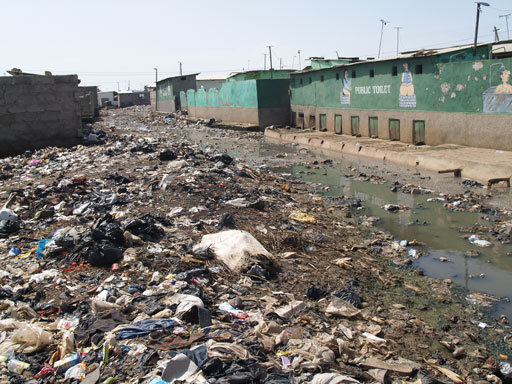1.2.2 Challenges related to infrastructure
The key challenge to meeting the increasing WASH service needs in Ethiopia’s urban areas is the availability of adequate resources, including finance and human resources that can provide and maintain the necessary infrastructures. The infrastructures required are:
- water supply system
- stormwater drainage system
- solid waste collection, transportation equipment and disposal sites
- liquid waste (including faecal sludge from latrines) transportation and disposal sites
- waste recycling or reuse equipment and facilities.
Water supply systems include developed water sources, treatment plants, storage reservoirs, and a network of distribution pipes delivering water to users. Growing population numbers and economic activity in urban areas mean that:
- Large amounts of investment are required to expand the capacity of these systems to meet the water needs of the population adequately. Mobilising sufficient funding is often difficult.
- Water sources, especially groundwater, may become depleted over time because of high extraction rates.
- Waste from industrial activities increases the threat of contamination of water sources.
Sanitation services include infrastructure for collection and safe disposal of liquid and solid waste. The amount of waste increases with the population size. Industrial activities also add to the type and composition of wastes generated. You may have noticed the excessive waste accumulated in different parts of urban areas. Figure 1.4 shows an example where rubbish and flooding have caused problems in a suburb of Accra in Ghana – similar scenes can also be found in Ethiopia.

Wastes from residential areas and from industries often require treatment before being safely discharged into the environment. Faecal sludge from latrines or toilets needs to be transported, treated and disposed of safely. Most towns do not have a proper treatment facility or a suitable disposal site. In emerging towns, where agricultural processing is a growing trend, industrial wastes, for example from coffee processing plants and hide processing factories, are causing an additional burden. Wastes from such industries are often released into the environment without treatment.
Again, mobilising sufficient finance to expand services in a timely manner is critical to managing these situations, but is difficult.
1.2.1 Challenges related to population size and characteristics
